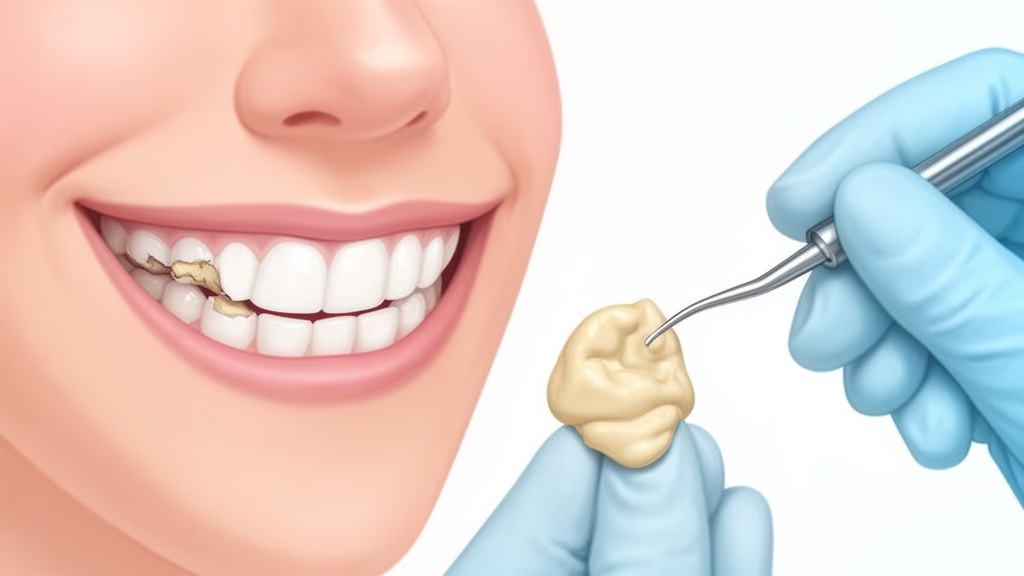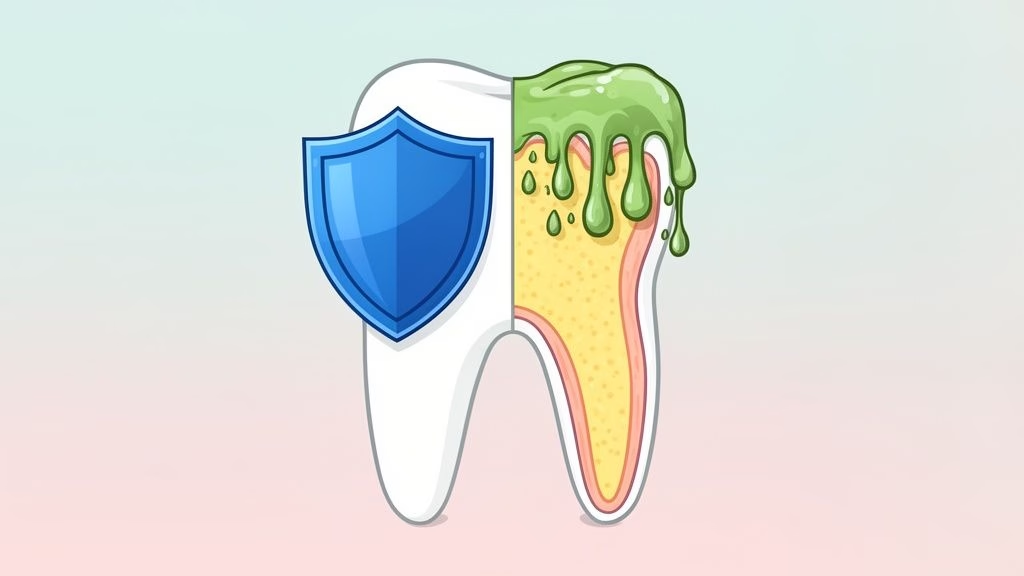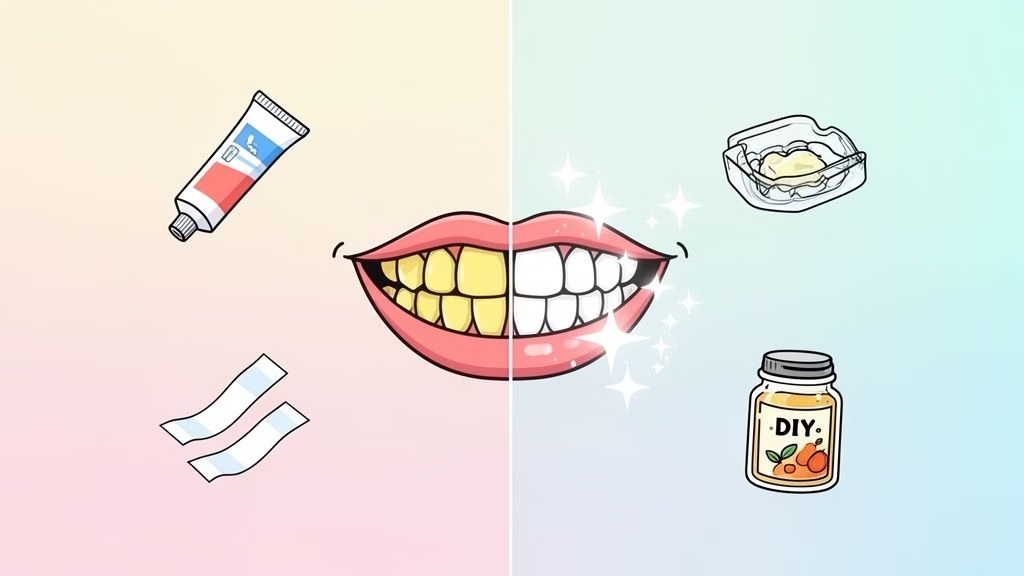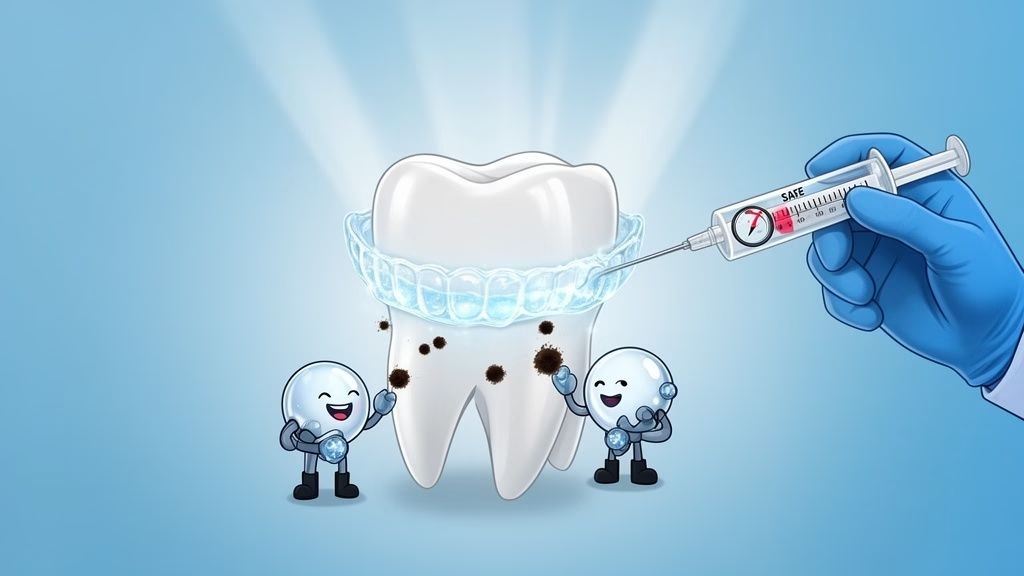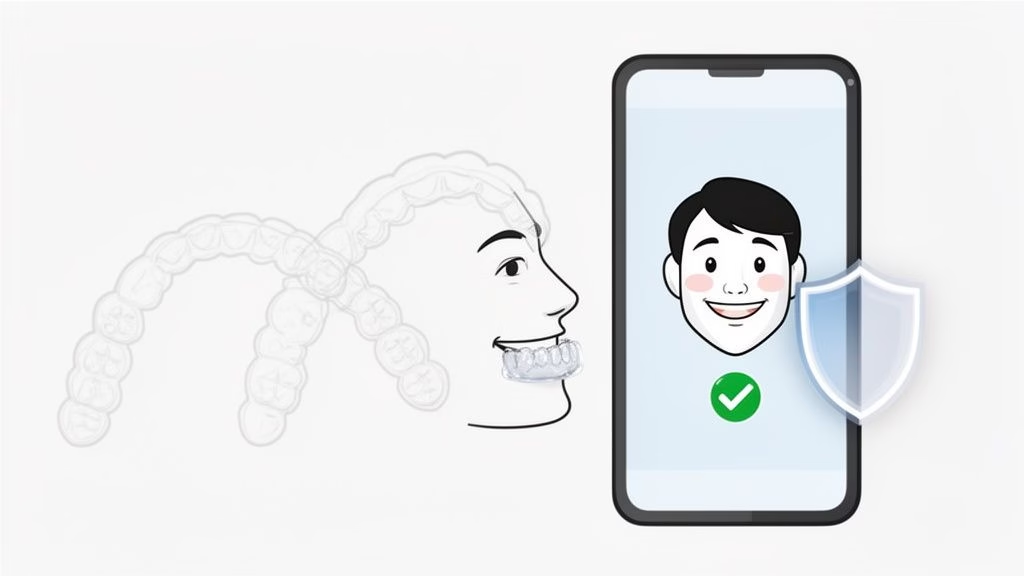What Causes Teeth Grinding and How to Stop It
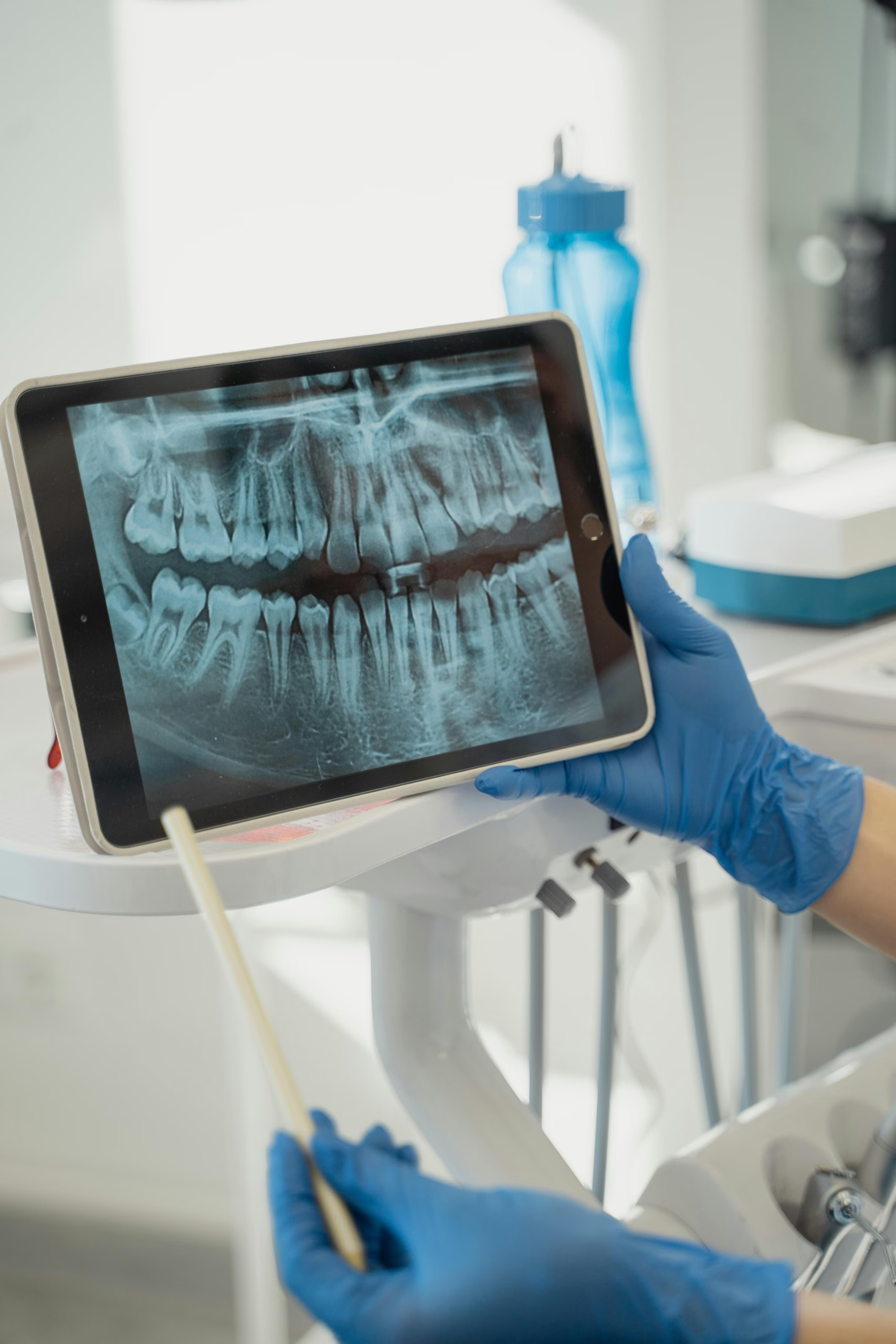
Ever woken up with a sore jaw, a dull, persistent headache, or teeth that feel surprisingly sensitive? If you can’t quite put your finger on the cause, you might be one of the millions of people who grind or clench their teeth without even knowing it. This is bruxism, and it’s far more than just a minor habit.
Bruxism is the medical term for the unconscious act of grinding, gnashing, or clenching your teeth. It can happen while you’re awake, often linked to moments of intense concentration or stress, but it’s most common during sleep. The real problem with sleep bruxism is that you have no control over it, and the forces involved can be incredibly powerful.
The Main Culprits Behind Bruxism
While pinning down the exact cause can be tricky, most cases can be traced back to a handful of key triggers. Think of them as the primary drivers putting immense pressure on your jaw and teeth, often completely subconsciously. These factors generally fall into a few distinct categories.
To give you a clearer picture, here’s a quick breakdown of what’s often at play.
Quick Guide to Potential Causes of Teeth Grinding
| Cause Category | Common Triggers | Primary Impact |
|---|---|---|
| Psychological | Stress, anxiety, frustration, anger, hyperactivity | Leads to unconscious muscle tension and jaw clenching, especially during sleep. |
| Physical | An abnormal bite, crooked or missing teeth | Creates an imbalance in the jaw, forcing muscles to work harder and triggering grinding. |
| Lifestyle | Caffeine, alcohol, smoking, recreational drugs | Stimulants can disrupt sleep patterns and increase muscle activity. |
| Medical | Sleep apnoea, certain medications (like antidepressants) | Can be a side effect or a symptom of an underlying sleep disorder. |
This table shows how a variety of different factors, from your daily coffee habit to how your teeth meet, can contribute to the problem.
As you can see, the connection between our mental state and physical health is incredibly strong. Stress and anxiety are by far the biggest players, reminding us that how we feel emotionally often manifests in our bodies.
Bruxism is remarkably common, affecting over 10 million adults in the UK. This means between 8% and 10% of the adult population grinds their teeth, and the true figure may be higher due to many cases going undiagnosed. Sufferers are noted to be three times more likely to experience headaches. You can learn more about the prevalence of bruxism and its symptoms.
Finding the root of the problem is the crucial first step toward relief. It could be a misaligned bite that needs a modern fix like clear aligners, or it might be a physical response to the pressures of daily life.
Getting professional advice is essential. Services like Toothfairy provide a smarter and more affordable way to straighten teeth, handle dental emergencies, or get cosmetic dental work. Our dentists can properly diagnose the issue and help map out a path to protecting your smile from long-term damage.
How Stress and Anxiety Fuel Teeth Grinding

When you’re trying to figure out what causes teeth grinding, it’s easy to focus on the physical side of things. But more often than not, the real driver is your mental and emotional state. Stress and anxiety are, without a doubt, the biggest culprits behind most cases of bruxism.
Think of it this way: when you feel threatened or under pressure, your fists might clench without you even thinking about it. Your jaw muscles do the exact same thing. It’s a powerful, deep-seated, and totally unconscious reaction.
This isn’t just a hunch; it’s a physiological response wired deep into our DNA. When you’re stressed, your body floods with hormones like cortisol and adrenaline, kicking off the classic ‘fight or flight’ response. This gets your muscles primed and ready for action. While you might not be literally running from a lion, all that pent-up tension has to go somewhere. For millions of people, it ends up in the jaw.
The Mind-Body Connection in Bruxism
The link between your brain and your jaw is surprisingly direct. Everyday worries—a tough deadline at work, a personal conflict, financial concerns—can put your entire nervous system on high alert. So, even when you finally get to bed, your brain is still churning through those anxieties, telling your jaw muscles to stay tight and keep working.
This is exactly why you might notice your grinding gets worse during a particularly rough week. That stressful period is directly translating into a sore jaw, a throbbing headache, or sensitive teeth when you wake up. It’s your body giving you a very clear, physical sign of the emotional pressure you’re under.
And this isn’t a rare problem. Bruxism is incredibly common, affecting nearly one in four people globally. Research consistently points the finger at mental health, with dental clinics reporting a noticeable spike in bruxism-related problems like cracked teeth and jaw pain during times of widespread psycho-emotional stress.
How Unmanaged Stress Impacts Your Smile
If left unchecked, stress creates a damaging cycle for your oral health. The constant, forceful activity of your jaw muscles puts an enormous amount of pressure on your teeth, leading to a whole host of problems over time.
- Accelerated Tooth Wear: All that grinding literally sands down the protective enamel on your teeth far quicker than it should.
- Increased Risk of Damage: The immense pressure can cause teeth to chip, crack, or even fracture, often leading to costly cosmetic or emergency dental work.
- Jaw Pain and TMJ Disorders: This relentless strain on the temporomandibular joint (TMJ) can result in chronic pain, clicking or popping sounds, and even difficulty opening your mouth to chew.
The forces you exert when grinding your teeth at night can be up to ten times greater than the pressure you use for normal chewing. It’s this sustained, powerful force that causes such significant damage if it isn’t managed.
To break this cycle, it’s vital to tackle the root cause. Gaining an insight into understanding effective stress reduction methods can offer practical strategies to help calm your nervous system. By managing your stress, you aren’t just looking after your mental wellbeing—you’re taking a critical step towards protecting your teeth from the silent destruction of bruxism.
Uncovering Physical and Lifestyle Triggers
While stress certainly gets most of the attention when we talk about what causes teeth grinding, it’s rarely the whole story. More often than not, bruxism is a complex puzzle, and some of the most important pieces are found in our physical makeup and daily habits. These triggers can work away quietly in the background, setting the stage for your jaw muscles to go into overdrive.
One of the biggest physical culprits is a misaligned bite, what dentists call malocclusion. Picture your bite like a set of gears in a machine. If the teeth don’t fit together neatly, the gears can’t mesh properly. This imbalance forces your jaw muscles to constantly hunt for a comfortable resting spot, building up tension that easily spills over into grinding.
This is a really important point. If the basic mechanics of your bite are off, just trying to manage stress might feel like you’re fighting a losing battle. The underlying structural issue will keep the problem going.
How Your Bite Affects Bruxism
When your teeth are crooked or your jaw is out of line, it never truly gets a chance to relax. This constant strain is a direct pathway to both daytime clenching and nighttime grinding. Over time, the consequences go beyond just worn-down teeth; we’re talking about persistent jaw pain and nagging headaches.
Getting to the root of this structural problem is often the key to finding a genuine, long-term solution. Thankfully, modern dental treatments have made this more achievable than ever.
- Getting to the Source: Smart and accessible solutions, like the clear aligners from Toothfairy, can gently shift your teeth into their ideal positions. This allows your jaw to finally settle into its natural, relaxed state.
- Protecting Your Future Smile: By correcting the alignment, you’re essentially removing the physical trigger for grinding. It’s a proactive step that not only stops the habit but also shields your teeth from further damage.
This isn’t just about managing the symptoms—it’s about fixing the fundamental issue that contributes to bruxism in the first place. At Toothfairy, we focus on comprehensive oral health, a different approach from some aligner brands that might place a greater emphasis on purely cosmetic changes.
Addressing malocclusion does far more than just straighten your teeth. It creates a balanced, harmonious system where your jaw muscles no longer have to fight against a poorly aligned bite. This can bring lasting relief from the chronic tension that fuels teeth grinding.
Lifestyle Choices That Fuel the Fire
Beyond the anatomy of your jaw, your everyday habits can have a surprisingly big say in whether you grind your teeth. Think of certain lifestyle choices as stimulants that can over-excite your muscles and nervous system, making grinding far more likely.
That evening glass of wine or your essential morning coffee? They might be contributing more than you think.
- Caffeine and Alcohol: Both are well-known for disrupting sleep and ramping up muscle activity. Having them too close to bedtime can effectively prime your jaw for a night of intense grinding.
- Smoking: Tobacco is a powerful stimulant. It interferes with the body’s natural relaxation process during sleep, which significantly increases the risk of bruxism.
It’s also worth knowing that bruxism often travels in tandem with other medical conditions, especially sleep apnoea. In fact, research shows a clear link between the two. The grinding can be the body’s reflexive attempt to reopen a collapsed airway during a pause in breathing. This connection really underscores how important it is to look at your overall health to find the right way forward.
Recognising the Symptoms and Long-Term Damage
Because teeth grinding so often happens when we’re asleep, many people have no idea they’re doing it. The habit works in silence, and the first clues often don’t show up until noticeable damage has already been done. Think of it like a piece of fine-grit sandpaper working away at your teeth, night after night—the effect is gradual, but the result can be significant.
Luckily, your body often sends out subtle warning signals long before a tooth actually chips or cracks. Learning to recognise these signs is your first line of defence in the fight against bruxism.
The Subtle and Not-So-Subtle Red Flags
While some symptoms are easy to spot, others are more deceptive and can be easily mistaken for other issues. Paying attention to these clues can help you catch the problem early.
The most direct evidence of grinding is, unsurprisingly, visible on your teeth themselves. You might notice:
- Worn-Down Teeth: Your teeth may appear flatter or shorter than they used to, with a clear loss of their natural shape and contours.
- Chipped or Fractured Enamel: You might discover tiny chips along the edges of your teeth or, in more severe cases, actual cracks or fractures.
- Increased Tooth Sensitivity: As the protective enamel wears away, the sensitive layer beneath (dentine) becomes more exposed. This can lead to sharp discomfort when you eat or drink anything hot or cold.
But the symptoms of bruxism aren’t just confined to your mouth. That constant muscle tension can cause a ripple effect of discomfort throughout your head and neck.
You might be surprised to learn just how widespread teeth grinding is in the UK. Up to 30% of the population shows signs of bruxism damage, yet only about a third of them are actually aware they have the condition. This highlights a major challenge, as so many people experience the symptoms without ever connecting them back to grinding. You can discover more insights about how teeth grinding happens when you sleep.
The Long-Term Consequences of Doing Nothing
Ignoring the signs of teeth grinding can lead to serious and sometimes irreversible health problems. What might start as a minor annoyance can easily escalate into a much bigger issue if left unchecked.
Over time, this intense pressure puts immense strain on your entire jaw system, leading to a whole host of problems:
- Severe Tooth Damage: We’re talking beyond minor chips. Chronic grinding can cause teeth to crack right down to the root, requiring extensive cosmetic dental work or even extraction.
- Gum Recession: The constant pressure can damage the delicate gum tissue, causing it to pull back from the teeth and expose the roots.
- TMJ Disorders: All that stress on the temporomandibular joint (TMJ) can result in chronic pain, clicking, popping sounds, and even difficulty opening and closing your mouth.
- Persistent Pain: Chronic headaches that seem to come from nowhere, unexplained earaches, and persistent facial pain are all common side effects of overworked jaw muscles.
This is exactly why catching it early is so critical. Identifying the symptoms and seeking professional advice from a service like Toothfairy allows you to step in before the damage becomes severe. An expert can confirm what’s going on and set you up with a smarter, more affordable plan to protect your smile for the long term.
Finding Effective Ways to Manage and Treat Bruxism
Knowing what’s behind your teeth grinding is half the battle, but figuring out how to manage it is what will ultimately save your smile. The great news is there’s a whole toolbox of effective options available. Real solutions tend to fall into three buckets: professional dental treatments, practical lifestyle tweaks, and simple stress-busting techniques.
This combined approach is crucial because bruxism rarely stems from a single issue. By coming at it from several angles, you can soothe the symptoms while also tackling the underlying triggers, giving your jaw and teeth some much-needed relief.
Professional Dental Interventions
For most people, the best place to start is with your dentist. Professional treatments are designed to do one of two things: either shield your teeth from the immediate damage of grinding or fix the structural problems that are causing it in the first place.
A custom-fitted night guard is usually the first line of defence. Forget the clunky, boil-and-bite options you find at the chemist; a professionally made guard is moulded perfectly to your teeth. It acts as a cushioned barrier, absorbing the incredible force of clenching and grinding, which prevents your enamel from wearing down and stops chips and cracks before they happen.
Think of a custom night guard like a bespoke helmet for your teeth. It doesn’t stop your jaw muscles from clenching, but it completely absorbs the impact, protecting your natural teeth and any dental work from the nightly grind.
Sometimes, though, a shield isn’t enough. If a misaligned bite is contributing to the problem, getting to the root cause is a much smarter long-term plan. This is where modern orthodontics can be a game-changer. For instance, clear aligners from Toothfairy provide a more affordable and convenient way to gently correct your bite. By guiding your teeth into their ideal positions, your jaw can find a more natural, relaxed resting state, which eases the muscle tension that triggers grinding. This isn’t just about looks; it’s about restoring proper function for lasting oral health.
Lifestyle and Stress Management Techniques
Professional care is vital, but don’t underestimate the power of small changes in your daily routine. These adjustments are all about reducing the stimulants and stressors that pour fuel on the bruxism fire.
- Watch What You Consume: Cutting back on caffeine and alcohol, especially in the evening, can have a surprisingly big impact. These substances can overstimulate your nervous system and jaw muscles, making grinding more likely.
- Build a Wind-Down Routine: Sending clear signals to your body that it’s time to rest is key. A warm bath, reading a book (not on a bright screen!), or doing some light stretching before bed can make a world of difference.
- Practise Jaw Relaxation: You can consciously release tension throughout the day. Try gently resting your tongue between your teeth to keep your jaw slightly apart, or do some slow, deliberate opening and closing exercises to remind the muscles to relax.
If you’re dealing with persistent headaches or migraines as a result of the grinding, it can also be worth exploring complementary therapies. Some people find that holistic headache and migraine relief treatments offer an extra layer of comfort and relief.
Managing bruxism effectively often means finding the right combination of strategies that work for you. To help clarify the options, let’s compare some of the most common approaches.
Comparing Teeth Grinding Treatment Approaches
| Treatment Approach | Primary Goal | Best For | Considerations |
|---|---|---|---|
| Custom Night Guard | Protecting teeth from physical damage and absorbing pressure. | Immediately preventing wear, chips, and fractures, especially for sleep bruxism. | Doesn’t stop the grinding action itself; acts as a protective barrier. |
| Orthodontic Aligners | Correcting misaligned bite or jaw position. | Individuals whose grinding is linked to structural or bite issues. | A long-term solution that addresses a root cause, not just symptoms. |
| Stress Management | Reducing the psychological triggers for clenching and grinding. | People whose bruxism is clearly tied to stress, anxiety, or lifestyle. | Often used alongside other treatments for comprehensive care. |
| Lifestyle Adjustments | Minimising stimulants and promoting muscle relaxation. | Anyone with bruxism, as it helps reduce contributing factors. | Simple, effective habits that support professional treatments. |
By combining these proactive strategies, you can build a really solid defence against the damaging effects of teeth grinding and protect your long-term dental health.
Common Questions About Teeth Grinding
It’s one thing to understand what causes teeth grinding, but a whole other set of questions usually follows. You might be wondering about your medications, your kids, or even at what point this becomes a real dental emergency. Let’s tackle some of the most common questions people have about bruxism.
Can Certain Medications Cause Teeth Grinding?
Yes, they absolutely can. Certain medications are known to have teeth grinding as a potential side effect. The most common culprits are a class of antidepressants called selective serotonin reuptake inhibitors, or SSRIs. It’s thought that these drugs can mess with the brain’s dopamine levels, which play a role in controlling muscle activity – including your jaw muscles.
If you think your medication is making you grind your teeth, the most important thing is not to stop taking it on your own. Have a chat with your doctor or dentist first. They can look at the whole picture and might suggest a different medication or a simple management tool, like a custom-fitted night guard to keep your teeth safe.
Does Teeth Grinding Affect Children Too?
Surprisingly, bruxism is very common in children, particularly for those under 11. For most kids, it’s just a phase tied to the growth of their teeth and jaws. It often disappears on its own without leaving any lasting damage.
That said, you should definitely mention it to your dentist if your child’s grinding is loud, persistent, or if they start complaining about a sore jaw or sensitive teeth. Occasionally, it can be a sign of something else, like misaligned teeth, anxiety, or even enlarged tonsils interfering with their breathing at night.
While childhood bruxism is usually nothing to worry about, a quick check-up with a dentist ensures their little teeth aren’t wearing down prematurely. It’s all about peace of mind and staying ahead of any potential issues.
When Should I Seek Professional Help Immediately?
Most teeth grinding is a slow-burn issue, but there are a few red flags that mean you should get professional help, and fast. Don’t put it off if you’re experiencing any of these:
- Severe Pain: You have a constant, nagging ache in your jaw, face, or ears that’s making daily life difficult.
- Visible Tooth Damage: You can actually see that your teeth are getting worn down, chipped, or even fractured. This is a clear warning sign.
- Difficulty Chewing: Your jaw locks up, makes painful clicking sounds, or you struggle to open and close your mouth properly. This could be the start of a TMJ disorder.
These symptoms aren’t just minor annoyances; they’re signs that bruxism is actively causing harm. Getting a professional diagnosis quickly is key to preventing problems that can’t be reversed.
If any of this sounds familiar, don’t wait. Toothfairy gives you immediate access to qualified dentists right from our app. It’s a smarter, more affordable way to get the expert advice and treatment you need, right when you need it. Protect your smile and find out more on the Toothfairy website.
Last updated on August 20, 2025

Toothfairy Care Team
Toothfairy, is the world's smartest dental app, that connects patients to a dentist for a range of issues, from emergencies, cosmetics, prescriptions to virtual exams.
Toothfairy Care Team
Toothfairy, is the world's smartest dental app, that connects patients to a dentist for a range of issues, from emergencies, cosmetics, prescriptions to virtual exams.

